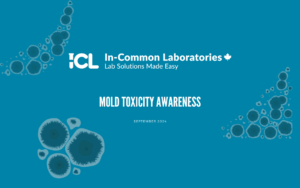Identify Mold Toxicity with Comprehensive Panels Offered at ICL

23rd September 2024
Identify Mold Toxicity with Comprehensive Panels Offered at ICL
At ICL we offer a comprehensive range of mold testing options,tailored to support a diverse range of goals.Whether you’re investigating mold sensitivities or mold-related health conditions, these diverse panels offer precise, actionable insights.
Our mold testing offerings include:
- Alletess Expanded Mold Immunoreactivity Panel (IgE, IgG, IgA)
- 16 molds, 47 items – the most comprehensive mold panel we offer, providing in-depth insight into patient mold exposure and immune reactivity.
- Alletess Mold Immunoreactivity Panel (IgE, IgG, IgA)
- 7 molds, 20 items – a more focused yet thorough option for assessing mold-related immune responses.
- Mosaic Diagnostics Mold IgE
- 13 molds – specialized testing to pinpoint IgE-mediated allergic responses to common molds.
- US Biotek Mold IgE Panels
- 15 Mold IgE Panel + Total IgE: offering both targeted and total immune response assessment.
- 15 Mold IgE Panel + Total IgE Add-On: easily integrate this test with other US Biotek food sensitivity tests for a more holistic immune profile (IgG, IgA, IgG4 options available).
- US Biotek Mycotoxin Panel*
- Tests for 16 mycotoxins from 5 key mycotoxin families, which are produced by over 100 mold species.
- Mosaic Mycotox Profile*
- Screens for 24 mycotoxins across various mold species. It uses advanced urine-based detection methods to assess mold exposure and its potential impact on health
|
|
MOLD FOCUSED EDUCATION
Mosaic Diagnostics: Mold and Mycotoxins: Fighting Chronic Mold Illness with Effective Testing and Treatment Protocols
